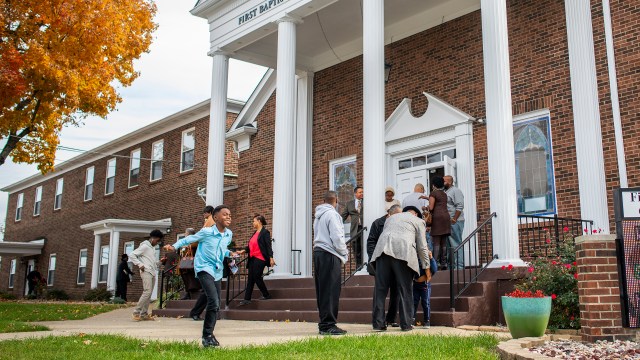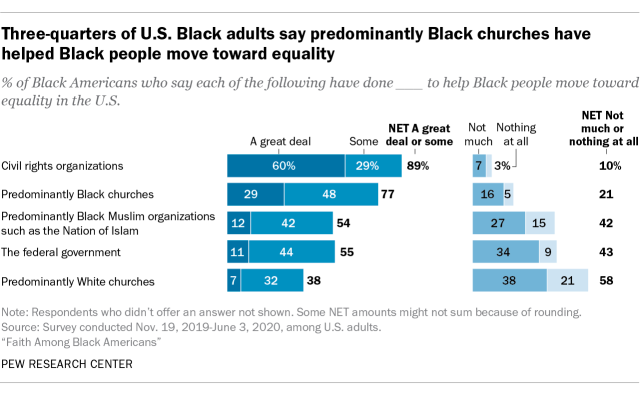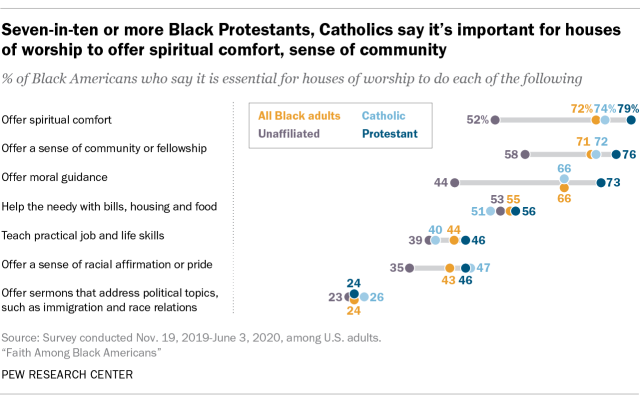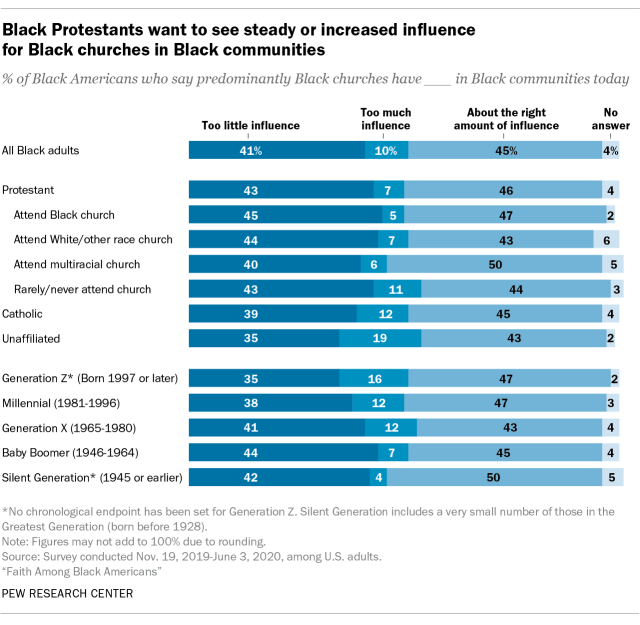
Though primarily places of worship, Black churches have long played prominent roles in African American communities, offering services such as job training programs and insurance cooperatives, and many of their pastors have advocated for racial equality. Today, around three-quarters of Black adults say predominantly Black churches have done either “a great deal” (29%) or “some” (48%) to help Black people move toward equality in the United States, according to a new Pew Research Center survey.
That is lower than the share of Black adults crediting civil rights organizations a great deal or some (89%) but higher than the share who credit the federal government (55%), predominantly Black Muslim organizations such as the Nation of Islam (54%), or predominantly White churches (38%).
Pew Research Center conducted this study to explore the breadth and diversity of Black Americans’ religious experiences. This survey represents Pew Research Center’s most comprehensive, in-depth study of the subject, drawing on a nationally representative sample of 8,660 Black adults (ages 18 and older). The sample consists of a wide range of adults who identify as Black or African American, including some who identify as both Black and Hispanic or Black and another race (such as Black and White, or Black and Asian).
Survey respondents were recruited from four nationally representative sources: Pew Research Center’s American Trends Panel (conducted online), NORC’s AmeriSpeak panel (conducted online or by phone), Ipsos’ KnowledgePanel (conducted online) and a national cross-sectional survey by Pew Research Center (conducted online and by mail). Responses were collected from Nov. 19, 2019, to June 3, 2020, but most respondents completed the survey between Jan. 21 and Feb. 10, 2020.
Here are the questions used for this report, along with responses, and its methodology.
The study defines the term Black congregations as those where the respondent said that all or most attendees are Black and the senior religious leaders are Black. However, the wording of several of the survey questions referred to predominantly Black churches, allowing respondents to define the term as they saw fit.
Majorities of Black adults, irrespective of the racial composition of their house of worship or whether they attend one at all, say predominantly Black churches have done at least some to help Black Americans. Even 66% of Black Americans who are religiously unaffiliated – describing themselves as atheists, agnostics or “nothing in particular” – hold this view, according to the survey of 8,660 Black American adults conducted Nov. 19, 2019, through June 3, 2020.
Overall, a majority of Black adults who attend religious services do so at Black congregations (60%), driven by the high share of Protestants (67%) who do so. (Two-thirds of Black Americans say they are Protestant, 6% say they are Catholic and another 6% say they identify with other Christian or non-Christian faiths.)
Sermon topics are one way that Black congregations stand out from other congregations. Black Americans who attend Protestant churches where most attendees and leaders are Black are more likely to say they hear messages from the pulpit about certain topics – such as politics and race relations – than are Black Protestant churchgoers who attend churches that are multiracial or White or where another race is in the majority.
At the same time, sermons on political topics are a relatively low priority for Black Americans. The survey asked about the importance of seven different functions offered by houses of worship, and respondents were least likely (24%) to say sermons on political topics such as immigration and race relations are essential. Higher shares say it is essential that houses of worship offer spiritual comfort (72%), a sense of community and fellowship (71%), moral guidance (66%), assistance to the needy with bills, housing and food (55%), practical job and life skills (44%) and a sense of racial affirmation or pride (43%).
And, if they were looking for a new place to worship, the race of others would not be a high priority for most Black Americans. Just 14% say it would be “very important” that most other attendees or senior religious leaders at a prospective new congregation share their race or ethnicity. Higher shares say it is very important for the congregation to be welcoming (80%), for the sermons to be inspiring (77%) and for the congregation to belong to their denomination (30%).
Many Black Americans think predominantly Black churches should have a greater role in society than they do now: About four-in-ten Black adults say predominantly Black churches today have “too little influence” in Black communities, compared with just one-in-ten who say they have “too much influence.” Nearly half (45%) say predominantly Black churches have “about the right amount of influence” in Black communities.
At the same time, Black Americans tend to say predominantly Black churches have less influence now than they did 50 years ago. Nearly half of Black adults believe this (47%), compared with 30% who say predominantly Black churches have more influence than 50 years ago and 19% who say they have about the same amount of influence now. The view that predominantly Black churches now have less influence is the most common stance among Black Americans regardless of whether they were alive 50 years ago, although the youngest adults are something of an exception: Roughly equal shares in Generation Z say predominantly Black churches have less influence today (42%) and more influence today (39%).
Note: Here are the questions used for this report, along with responses, and its methodology.


